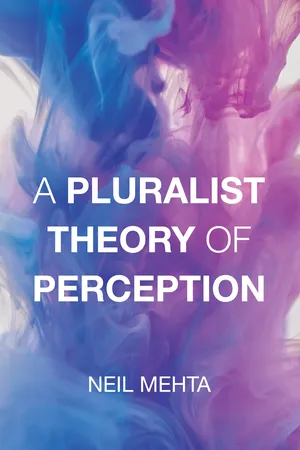
- English
- ePUB (mobile friendly)
- Available on iOS & Android
A Pluralist Theory of Perception
About this book
Most contemporary theories of perception, including leading forms of representationalism and naive realism, are monistic: they assume that to consciously perceive is to deploy only one kind of sensory awareness. In A Pluralist Theory of Perception, Neil Mehta instead argues for pluralism, which says that to consciously perceive is to deploy two very different kinds of sensory awareness in concert. Mehta argues that pluralism can simultaneously explain what is common to all forms of consciousness and what is distinctive about conscious perception.
Mehta's preferred version of pluralism, which he calls rich pluralism, says that conscious perception is constituted by successful sensory representation and deep awareness. Successful sensory representation is a representational form of awareness whose targets include particulars. It is found in perceptions, whether conscious or unconscious, but not in hallucinations. By contrast, deep awareness is a nonrepresentational form of sensory awareness whose targets are certain universals—the sensory qualities. Deep awareness constitutes one kind of consciousness, it is common to conscious perceptions and hallucinations, and it reveals part of the essences of its targets. Mehta argues that although rich pluralism appears to be less parsimonious than monism, it is not. All monistic theories that are explanatorily adequate end up being even more complex than rich pluralism. Thus, rich pluralism is the most spartan theory that can shoulder the explanatory load.
Frequently asked questions
- Essential is ideal for learners and professionals who enjoy exploring a wide range of subjects. Access the Essential Library with 800,000+ trusted titles and best-sellers across business, personal growth, and the humanities. Includes unlimited reading time and Standard Read Aloud voice.
- Complete: Perfect for advanced learners and researchers needing full, unrestricted access. Unlock 1.4M+ books across hundreds of subjects, including academic and specialized titles. The Complete Plan also includes advanced features like Premium Read Aloud and Research Assistant.
Please note we cannot support devices running on iOS 13 and Android 7 or earlier. Learn more about using the app.
Information
Table of contents
- Cover
- Title Page
- Copyright
- Dedication
- Contents
- Preface
- 1. Rich Pluralism Introduced
- I. The Case for Partly Revelatory Awareness
- II. Rich Pluralism versus Representationalism
- III. Rich Pluralism versus Naïve Realism
- IV. Other Explanatory Challenges; Concluding Thoughts
- Glossary
- References
- Index